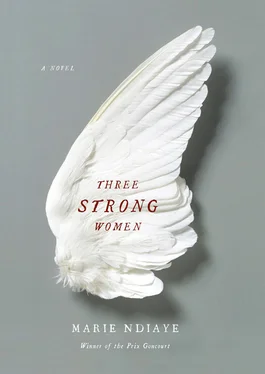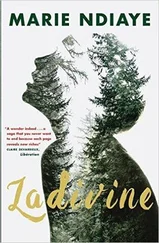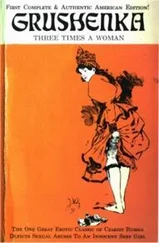He seemed younger than her, about twenty perhaps.
With a high, shrill voice, almost like a child’s, he asked, “You okay?”
“Yes, thanks, and you?”
“I’m okay. My name’s Lamine.”
She hesitated a moment, then, not quite managing to suppress a proud, almost arrogant note creeping into her voice, she told him her name: “Khady Demba.”
He got up and sat down beside her.
The deserted beach of grayish sand was covered in garbage (plastic bottles, rubbish bags split open, and the like), which Lamine eyed with cold detachment, looking to see if any of it could possibly still be of use, passing from one item to the next, promptly forgetting each one the moment he’d dismissed it, consigning it to oblivion as though it had never existed.
His eyes fell on Khady’s leg. His face was twisted in horror, but he tried to hide it clumsily behind a hesitant smile.
“You’re really hurt, aren’t you?”
A bit peeved, she looked down in turn.
It was a gaping wound, encrusted with dried blood covered in sand.
The dull nagging pain seemed to get worse the more she looked at it. Khady let out a groan.
“I know where we can get some water,” Lamine said.
He helped her to her feet.
She sensed the nervous strength of his rawboned, tight body, like a coiled spring, as if it were being kept firm, hardened by the constant vigilance and the privations he’d endured, no less than by his ability to blot them out, just as he seemed to negate, to banish from his mind, any object on the beach that was of no interest.
Khady knew her own body was slim and robust, but it did not compare to this boy’s, tempered in the icy water of unavoidable deprivation, so that for the first time in her life she felt luckier than another human being.
She checked to make sure that the wad of banknotes was still there, held in her elastic waistband.
Then, refusing his offer of help, she walked beside Lamine toward the row of houses and shops with corrugated-iron roofs that lined the beach above the high-water mark.
At every step, the pain intensified.
And because, on top of that, she was very hungry, she yearned to be able to acquire an insensible, inorganic body, with no needs or desires, nothing but a tool in the service of a plan that she still knew nothing of but that she understood she’d be made to learn about.
Well, she did know one thing. And this she knew, not as she usually knew things — that is, without knowing that she knew — but in a clear and conscious way.
I can’t go back to the family, she said to herself, not even wondering (because it was useless) whether that was a good thing or just an extra source of unhappiness. Thinking clearly and calmly, she was well aware that she had, in a way, made a choice.
And when Lamine had told her of his own intentions, when — in a rather strident voice interrupted by little nervous giggles when he couldn’t think of a word or seemed afraid of not being taken seriously — he’d assured her that he’d get to Europe one day or die in the attempt, that there was no other solution to his problems, it appeared to Khady that all he was doing there was making her own plan explicit.
So, in deciding to join him, her conviction that she was now in control of the precarious, unsteady equipage that was her existence hadn’t been shaken in any way.
Quite the opposite.
He’d led her to a pump in the center of town so that she could wash off the sand sticking to her wound. Then he explained that he’d tried several times to leave, that he’d always been prevented by unforeseen circumstances, sometimes large impediments, sometimes small (last night it had been the ramshackle condition of the boat), but that he now had sufficient knowledge of what he might find to brave the obstacles and evade or overcome all eventualities, of which there couldn’t be that many and surely he’d seen them all.
Khady instantly recognized that he was up to speed with things she couldn’t even imagine, and that by staying with him she’d benefit from absorbing his knowledge, instead of having to grope her own laborious way to it.
How remarkable she found it that she hadn’t said to herself, What else can I do, in any case, but follow this boy? but rather had thought that she could take control of the situation and profit from it.
Racked with pain, she washed her torn calf.
The two pieces of flesh were clearly separated.
She tore a strip off the batik that contained her belongings and wrapped it tightly around her calf, binding together the two flaps of the wound.
Throughout the heavy, still days that followed, the place remained grayish, but the light was bright, as if the shimmering metallic surface of the sea were diffusing a leaden glare.
It seemed to Khady that she’d been granted a reprieve so she could steep herself in information such as she’d never acquired in twenty-five years; and discreetly, too, without appearing to learn anything, an instinctive caution having stopped her revealing to Lamine how ignorant she was.
He’d brought her back to the courtyard their group had departed from.
Many new people were gathered there, and the boy went around collecting orders for food and water, which he then ran to get in town.
He never asked Khady to pay for what he’d bring back for them to eat (omelet sandwiches, bananas, grilled fish), and Khady never offered, because she’d decided never to talk about anything that hadn’t already been aired, confining herself to short replies to questions that were equally laconic, not mentioning money since Lamine didn’t, questioning him on the other hand with suppressed eagerness about the journey he was planning and the means of achieving it. On that topic she tried to conceal her hunger for information behind an air of gloomy, bored restraint; she felt a veil of morose impenetrability covering her face, just as it had done in her husband’s family, hiding her wan, tepid thoughts behind it.
Oh, how fast her mind was working now! Sometimes it got in a muddle, as if intoxicated by its own abilities.
It was not too sure now whether the ardent young man standing before it was Khady’s husband or a stranger called Lamine, or why exactly it had to remember everything that came out of that mouth with the hot, almost feverish breath, and it felt tempted — at rare, very brief moments — to flush itself clean and return to its previous state, where nothing was demanded of it except to avoid getting involved in anything to do with real life.
Khady memorized, then, at nightfall, lying in the courtyard, filed away the new pieces of information in order of importance.
What had to be kept continually in mind was this: the journey could take months, even years, as it had for a neighbor of Lamine’s who’d only reached Europe (what “Europe” was exactly, where it was situated, she put off until later to find out) five whole years after leaving home.
This too: it was imperative to buy a passport. Lamine had reliable connections for getting one.
And then: the boy now refused to go by sea from this coast.
The journey would be longer, much longer, but it would go through the desert and arrive at a certain place where you had to climb to get into Europe.
And then, and then: Lamine had said many times — his suddenly mulish, inscrutable, smooth face shining with sweat — that he didn’t mind dying if that was the price of pursuing his aim, but to go on living as he had done up till now, that he refused to do.
Although Khady spontaneously blotted out everything to do with the boy’s earlier life, although she tried not to listen to anything she thought inessential, whatever was likely to upset or embarrass her, even, inexplicably, to fill her with a muted sadness, as if her own earliest memories were being revived rather than his, she couldn’t help retaining the fact that a stepmother — his father’s new wife after his mother’s death — had for years beaten Lamine so hard he’d almost gone mad.
Читать дальше












